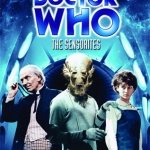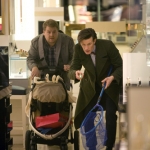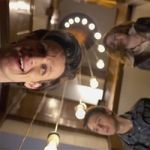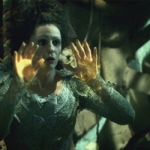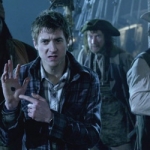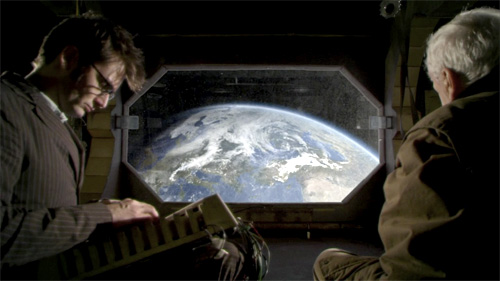
Episode: Doctor Who 4.18 – “The End of Time, Part 2”
Original Air Date: January 1, 2010 in the UK; January 2, 2010 in the US
Screencaps by In A Dream Caps.
The last episode in which David Tennant appears as the 10th Doctor, “The End of Time, Part 2” received a mixed response from fans of the popular science fiction television series.
At the end of the first portion of “The End of Time,” the narrator is revealed as the Lord President (played by Timothy Dalton), the Time Lord leader who proclaims that this day, which just so happens to be Christmas, will be “the day the Time Lords returned.” Apparently it was The Doctor who trapped the remaining Time Lords in the last days of the Time Wars so long ago in order to prevent them from unraveling the fabric of reality and ending time forever. What The Doctor didn’t know was that the Time Lords engineered an escape, using the only other surviving Time Lord, The Master (John Simm). It is not until “The End of Time, Part 1” that The Doctor realizes the true purpose of the drumming noise that has plagued The Master since childhood. Rather than an auditory symptom of some type of psychosis, “the drums” that The Master hears were implanted in his brain by the trapped Time Lords. When The Master transforms every human on Earth into a clone of himself, “the drums” in his head are amplified, creating a link that reaches through time and space to connect the Time Lords to The Master.
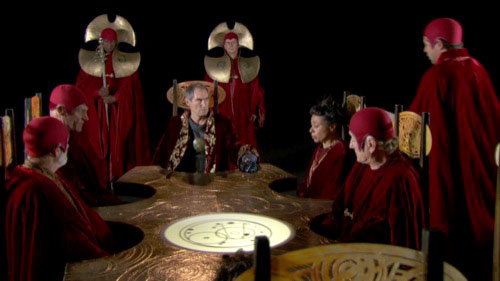
The Doctor, being the brilliant individual that he is, quickly determines that The Master’s plan is only one part of the Time Lords’ plot for escape and ascension to a state of pure consciousness. In order to stop the end of time, The Doctor must leave the relative safety of the spacecraft in which he and Wilf and a couple of Vinvocci aliens escaped from The Master, free falling from the sky and crash-landing in the mansion where The Master is waiting for the inevitable confrontation between the only two remaining Time Lords.
The most unsettling and controversial moment in “The End of Time, Part 2” involves The Doctor’s use of a gun for what is the first time since the 2005 reboot of the Doctor Who series. As we know from various comments the 9th and 10th Doctors make — including one in episode 4.04, “The Sontaran Stratagem,” when The Doctor tells a military official, “You’re carrying a gun. I don’t like people with guns hanging around me. Alright?” — The Doctor is averse to the use of guns in general and always refrains from using them personally… until now. Such an uncharacteristic move is unsettling for contemporary Doctor Who fans; however, when we look at the 10th Doctor’s trajectory thus far, especially taking into consideration the latter half of series four, it seems a well-chosen and interesting crescendo.
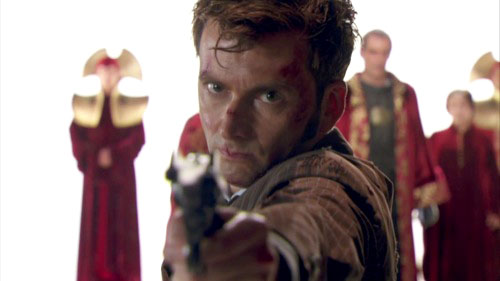
Combined with the uncharacteristic tantrum that The Doctor throws when he realizes what he must do to save Wilf’s life, The Doctor’s decision to arm himself illustrates the extreme to which The Master and the other Time Lords have pushed him. After three full series of Doctor Who episodes, it is safe to assume that fans of the show have a general idea of what to expect from the 10th Doctor, but “The End of Time, Part 2” keeps even the most avid viewers guessing and leaves audiences to wonder how different the 11th Doctor (played by Matt Smith) will be from David Tennant’s portrayal of the character.
A second noticeable oddity that caught my attention is the similarity between the Time Lords’ professed desire to ascend beyond physical bodies into pure consciousness and that of “The Ancients” of the SyFy television series Stargate: Atlantis. Although the Time Lords were present to varying degrees throughout both segments of “The End of Time,” the episode doesn’t take the time necessary to explain fully what happened when The Doctor banished the Time Lords and all the other horrors of the Time Wars. Though it might be understandable for Russell T. Davies and Steven Moffat to shy away from making any definitive statements about The Doctor’s role in banishing the Time Lords and ending the Time Wars given their brief involvement in such a long-standing science fiction series, the decision to use the subject matter that makes up the bulk of the series four finale locked the writers into providing audiences with more than the meager explanations seen in “The End of Time, Part 2.”
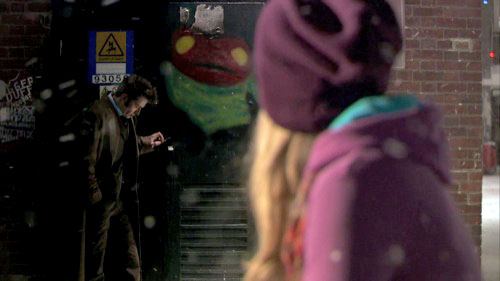
Combined with the amount of time spent watching The Doctor visit various friends and companions before his regeneration, “The End of Time, Part 2” lacks the flair and pace that characterize some of the best episodes released since the franchise’s 2005 reboot. It will certainly be interesting to see what the fifth series of Doctor Who has to offer, especially since Russell T. Davies has relinquished control of the show to Steven Moffat, who will be the executive producer and head writer for the series.
Series five of Doctor Who, which will be promoted as “Series One,” is scheduled to air in Spring 2010. For more information, visit the official Doctor Who web site.
Rating: 3.5 / 5 Stars


